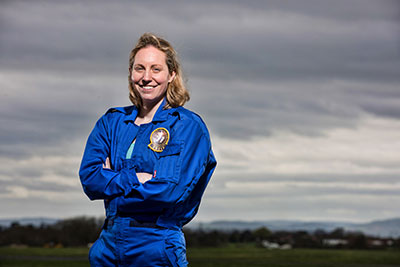 Space News space history and artifacts articles Messages space history discussion forums Sightings worldwide astronaut appearances Resources selected space history documents |
If you have previously registered, but forgotten your password, click here.
Chris Hadfield, with others, appears to have set the tests based on real astronaut recruiting schemes and they are extremely difficult. He is tasked to tell candidates if they have failed the course. On the first show two of the twelve were asked to leave. All very interesting, especially handling the helicopter. Looking forward to the next episode and it certainly seems a cut above other reality type shows, but I guess I'm biased. | ||||||||
| spacepete11 | I thought this was a very interesting programme. It's actually filmed not far from me which I didn't realise initially. Chris Hadfield and his team came across very well as you would expect. A very interesting cross-section of candidates with varying backgrounds. Yes, flying the helicopter looked very interesting and if anyone feels they have what it takes you can book that and try it yourself. Looking forward to episode 2 next Sunday evening. | |||||||
| Robert Pearlman | University of Leicester release Leicester space scientist proves she has what it takes to become an astronaut | |||||||
| Kite | I thoroughly enjoyed this set of programmes and think it was done very well. It makes you realise just how tough it is to become an astronaut and this was only a starter towards the real goal. Chris Hadfield was an ideal choice to lead the team who were left with a difficult decision to select the winner but in my very unqualified opinion I think they made the correct choice. A little surprised there's not been more interest shown on cS, in particular in the UK where it has been broadcast because it has been done in a professional way and was educational and absorbing. Congratulatoins to Dr Suzie Imber and hopefully her ambition will be fullfilled. Also to the two runners up whom I am sure will also make the grade one day. All of the contestants were very brave to take on such a difficult and revealing course with such great enthusiasm. | |||||||
| Tykeanaut | I totally agree Kite.  | |||||||
| Rick Mulheirn | I thoroughly enjoyed the series of programs and the winner was a worthy one. I can't help but think however that the whole process may have been academic. With the UK leaving the European Union, I'd imagine the chances of any prospective ESA astronaut being selected from the UK are pretty slim - with or without Chris Hadfield's recommendation. Tim Peake is currently in training for a second flight but post Brexit that was in doubt. And I doubt we will be able to afford to buy our way on to the ISS in future. | |||||||
| OLDIE | I thought it to be an excellent series, and at times (particularly in the underwater lab) quite scary. As Chris Hadfield pointed out, astronauts put their lives on the line every time they fly. One of the difficult things for new prospective astronauts is to face up to this reality, and realise that it isn't just going to be a great adventure. One option, which I presume is still available, post Brexit, is for U.K. applicants to apply for U.S. citizenship, and fly as a U.S. citizen. | |||||||

